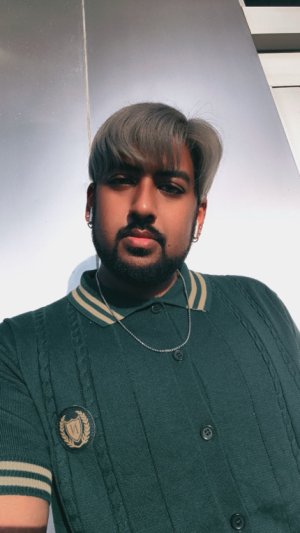
A Perfect Pitch with a Flat Note Ending
Kpop Demon Hunter is an entertaining film with a unique concept, vibrant visuals, beautiful cinematography, and a few catchy songs, but unfortunately, it relies too heavily on overused tropes and underdeveloped storytelling. As a result, it feels like it was made to appeal to a narrow audience, rather than exploring the full potential of its creative premise.The film centers around Huntr/X, a K-pop girl group that doubles as demon hunters, and the Saja Boys, a K-pop boy group who are demons. While the setup is promising, the story fails to give the Saja Boys meaningful development. Only Jinu, the group’s leader, is given a real arc, he displayed glimpses of complexity as he struggles between good and evil. However, his journey is cut short. When he finally comes to his senses, he’s killed off within seconds, which undercuts emotional payoff tremendously.
Jinu’s character had strong potential, his desire to be free and his sense of being misunderstood were compelling. That same depth could have been extended to the rest of the Saja Boys. Giving each member a unique reason for being in the group and showing their eventual growth would’ve added real emotional weight and created a stronger connection to the audience. But they were reduced to background noise.
It would have been far more impactful to show The Saja Boys and Huntr/X teaming up, to defeat Gwi-Ma, providing a powerful message of unity and growth. Instead, the film takes a shortcut, and it shows.
The film also leans into a somewhat problematic dynamic: girls fix problems and saves the world, while boys create them and seek destruction. All the main villains are male, and while there are female villains, they’re under the control of Gwi-Ma. That dynamic felt one-sided and oversimplified. This one-dimensional portrayal felt both imbalanced and reductive. There was a real opportunity to subvert expectations and show unity and collaboration between the groups, but instead, the film leaned into division and sacrifice.
The film also leaves a number of questions unanswered: (just a few listed)
1. What happened to Rumi’s aunt?
2. Was the demon world actually sealed successfully?
3. What are the consequences of Rumi being half-demon and half-hunter? (If there are any)
4. Were past bands completely unsuccessful, and is Huntr/X the first to succeed?
5. And if Gwi-Ma is defeated, is he truly gone or could he return?
On the musical side, only three songs stood out as potential singles: “What It Sounds Like,” “Free,” and “Golden.” The rest are decent, but feel more like standard movie soundtrack that’s only enjoyable in the moment, but not something I’d revisit outside the film.
Overall, I did enjoy the movie, but I wasn’t satisfied with the direction it took. The ending, in particular, felt rushed and underdeveloped. This concept would’ve worked much better as a limited series, where the characters and their arcs could be properly explored and given the depth they deserved. As it stands, some moments felt sloppy, inconsistent, and creatively lazy! Especially in the final act. I may be overthinking this movie, but at least it’s a good one time watch.
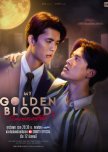
It’s Not Perfect, But It’s a Bloody Good Time
I was pleasantly surprised by how much I enjoyed My Golden Blood. While the storyline isn’t groundbreaking, it’s still engaging and fun to watch. It strikes a balance between drama, romance, and supernatural elements, making it a solid pick for fans of the genre.However, I did notice some oddly timed cuts throughout the show. At times, scenes felt abruptly shortened or transitioned too quickly, which occasionally disrupted the pacing.
As for the acting, I personally didn’t find it deserving of the criticism I’ve seen in other reviews. No, it’s not Oscar-level, but it’s more than adequate for a TV series of this type and far better than many others I’ve seen.
The CGI and special effects were admittedly a bit dated and occasionally clunky, but oddly enough, that added a sense of nostalgia for me. It reminded me of some of Thailand’s earlier supernatural dramas, there’s a charm in that slightly rough-around-the-edges feel.
What absolutely cannot be denied is the chemistry between the two leads. Their connection is palpable and carries much of the emotional weight of the series. It’s that dynamic that really keeps you invested, even during some of the more cliché or corny moments, which, let’s be honest, are almost expected in a vampire-themed show.
Overall, I genuinely enjoyed My Golden Blood. Yes, it has its flaws, but it also has heart. If you’re a fan of vampire stories, don’t let the negative reviews deter you. Give it a chance, you might end up liking it as much as I did.

Fangs of Fortune: A Cinematic Masterpiece with Layers of Story
This series is a visual masterpiece, beautifully shot with stunning cinematography that captivates you from start to finish. Not a single episode feels slow or unnecessary; each one keeps you fully engaged. I really appreciated how the show explains key events within the same episode, creating a sense of clarity while also building toward a larger, more intricate narrative. The storyline itself is exceptional, layered, thoughtful, and full of purpose.One of the things I loved most was how seamlessly the show blended genres, offering a bit of everything without ever feeling disjointed. While the ending was somewhat predictable and I found myself wishing it had taken a different path, it didn’t diminish my enjoyment in the slightest. Overall, this is a truly remarkable series that I’d highly recommend.

A Heartfelt Journey of Resilience and Triumph
Warning - this movie does have attempted suicide.Big World is a profoundly moving film that showcases Jackson Yee’s phenomenal performance as Liu Chunhe, a young man with cerebral palsy (CP) determined to prove that his condition does not define his potential. Jackson Yee brings raw authenticity and emotional depth to Chunhe, a character who seeks equality and the same opportunities as others, whether it’s attending college, securing a job, or earning a driver’s license. Through his unyielding determination, Chunhe demonstrates that no obstacle is insurmountable with perseverance.
The film masterfully captures Chunhe’s inner struggles, particularly in a heart-wrenching scene where he questions why he was born with CP, a condition that remains a medical enigma.
Equally compelling is Chunhe’s yearning for love. He knows it won’t be easy, but his understanding of the challenges doesn’t lessen his hope.
A pivotal moment comes during Chunhe’s confrontation with his mother, whose misguided attempts to shield him by isolating him and fixating on his disability only deepen his sense of being a burden. The raw emotion in Jackson Yee’s delivery when Chunhe admits to feeling like “dead weight” to his family is unforgettable, reflecting the pain of overhearing childhood conversations and enduring societal stares.
While Chunhe’s mother mishandles her protective instincts, the film doesn’t shy away from addressing these flaws. Her eventual explanation and apology toward the end offer a satisfying resolution, highlighting the complexity of familial love.
The conclusion, with Chunhe and his grandmother (his biggest supporter throughout the film) embracing a fresh start is both uplifting and authentic, tying the narrative together with hope.
Big World delivers a powerful message about resilience, personal growth, and the pursuit of equality. It’s a heartwarming, inspiring story that navigates life’s challenges with grace, leaving the audience moved and motivated.

“Ball Boy Tactics”: A Slam Dunk of Realism, Romance, and Heart
I approached Ball Boy Tactics with mid expectations as trailers can be misleading, but I was pleasantly surprised by how much I enjoyed this show. It delivers a grounded, emotionally resonant story that handles its characters and relationships with maturity and purpose.The romantic development between Jeong U and Ji Won feels incredibly authentic. Ji Won’s tendency to think things through before giving answers was sweet and thoughtful, even though not all his choices are perfect. This added depth to his character and made his emotional journey believable. Jeong U’s confusion and growth are portrayed thoughtfully, and I appreciated that the show didn’t rely on melodramatic tropes like cheating. Instead, it emphasized clear boundaries, with characters ending previous relationships before beginning new ones. It was a refreshing and responsible approach that elevated the narrative. The pacing of the romance is also well-balanced. Rather than dragging out the relationship, the show allows their connection to blossom naturally. Their chemistry is undeniable. From subtle glances to affectionate moments. The emotional vulnerability they display, especially during moments of conflict, made their relationship feel personal and relatable. The supporting couple, Seung Jin and Eun O, offered some of the show’s sweetest moments, though I wish their storyline had been given more room to grow. Despite Seung Jin’s endearing cluelessness, their chemistry was evident and compelling. It’s a missed opportunity that their storyline didn’t flourish further, but it certainly left an impression.
Visually, the series boasts strong cinematography and is supported by a thoughtful soundtrack. The performances across the board were excellent, bringing emotional nuance to each character.
Overall, Ball Boy Tactics exceeded my expectations. It’s a heartfelt series with substance, strong performances, and a realistic portrayal of relationships. If a spinoff, movie, or even if a short special series were made to explore the second leads’ journey, I will be watching.

Drama That Delivers—With One Major Flaw: High Street
Season 1 of Senior High was decent, but the series truly found its footing in Season 2. As the story progressed, I became more invested in the characters and their development. Initially, I found Z (Zaria) and Archie quite insufferable, but High Street (S3) gave them strong redemption arcs. I was genuinely interested in their well-being and wanted to see more of them on screen in the beginning.The progression of Tim and Poch’s relationship could have been handled more smoothly, but I still appreciated it. Their struggles were rooted in understandable issues, mainly a lack of communication and trust, which they were eventually able to overcome in a satisfying way. In contrast, Kenjie and Sanya’s storyline didn’t resonate with me, though their limited screen time worked in the show’s favor.
Roxy had potential for a more prominent role, but her responsibilities as a mother seemed to limit her presence in key scenes. While some of her choices were understandable, they were occasionally frustrating. As for Sky, her development started off mildly but became one of the stronger arcs. Although she was portrayed as overly trusting and a bit of a pushover early on, her growth into a more street-smart, self-reliant character was a highlight.
One of the show’s greatest strengths is its consistent, well-paced drama. Nothing felt out of place or unnecessarily exaggerated. The narrative remained fresh and engaging throughout. However, the ending was a major letdown. A key character’s death felt abrupt and unnecessary, especially after everything the group had endured. It didn’t serve the story in a meaningful way and undermined the emotional payoff of their journey.
Despite the ending, I thoroughly enjoyed High Street. Although I didn’t love all of the characters storylines, I was glad to see them all back in High Street. Each episode kept me on edge, and I was especially glad to see Tim and Poch get their happy ending. If you’re looking for a series filled with drama, mystery, thriller elements, and a touch of romance, this show is a strong contender. Just be sure to watch Seasons 1 and 2 first to fully understand the events that unfold in Season 3.
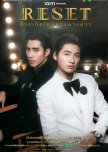
A Gripping Journey Through Time, Love, and Consequences
Reset is a captivating series that blends striking cinematography with a well crafted script. The narrative follows Armin’s compelling journey as he attempts to navigate and ultimately change his future. While his extended sequences of internal dialogue occasionally slowed the pacing (and was slightly annoying), they also served as a thoughtful device to reveal his process of piecing together the truth and why the people from his past played an important role with all the events that transpired. His repeated references to future events/slang/things felt like his subtle way of signaling to Thada that he truly came from that time, so when those moments eventually unfolded he would see what he’s been saying is true.All the characters are richly developed, each serving a distinct purpose that adds emotional depth and narrative weight to the story. The progression is well paced, skillfully weaving together events from the future and the past, tying up most loose ends and addressing lingering questions. The conclusion felt satisfying and emotionally resonant, providing a strong sense of closure.
That being said, a few questions remain unanswered:
1. What became of Ren, was he ever found? I know he said he wanted to be an actor only, but with all he did what path did he end up on?
2. Was Lilly ever held accountable for her what she was doing to the talents?
3. Did Achi ever break away from Lilly? And if not, did he manage to distance himself from Lilly and come to realize that she had been using him all along?
Overall, Reset is a gripping, emotionally charged experience. It kept me on edge, evoked laughter and tears, and delivered moments of genuine shock. Without question, it stands among the best BL dramas to emerge in 2025.

Shark 2: Still in Deep Waters, Still Fighting
Shark 2: The Storm is a solid and satisfying follow-up that builds meaningfully on the events of the first film. While the storyline doesn’t break new ground narratively, it compensates with a sense of coherence and emotional continuity that keeps viewers engaged. The plot feels well structured and purposeful, allowing the characters’ journeys to take center stage.One of the strongest aspects of the sequel is how it explores the protagonists’ lives post-prison. It’s refreshingly grounded watching them attempt to reintegrate into everyday society feels both authentic and poignant. The series does an admirable job of showing that while the desire to change is real, the past has a way of lingering. I appreciated that the characters stayed true to who they were at their core, yet also evolved in believable ways. Their continued bond and commitment to a better life added an emotional weight that made the quieter moments as compelling as the action scenes. A standout theme was the idea that people can change, but that old instincts may return when circumstances demand it.
The introduction of new characters added some fresh dynamics, though not all of them landed for me. That said, Lee Yeon Jin was a clear highlight charismatic, complex, and a welcome addition to the cast. I need more background on her.
Episode 4’s outtake was a delightful surprise, charming, and heartwarming. They were just adorable. As for the action sequences, they were a noticeable step up from the first installment. Better choreography, pacing, and cinematography made them genuinely thrilling. The soundtrack also deserves a mention, it elevated the energy of key scenes and often had me fully immersed and cheering.
While some story developments were predictable, I didn’t necessarily mind that. In fact, one major turn that I personally disliked felt narratively justified, even if it wasn’t what I wanted to see.
In the end, Shark 2: The Storm was an enjoyable binge with depth, grit, and heart. Though I typically prefer shows that wrap things up within one season, I wouldn’t be opposed to a continuation, if it maintains this level of character development and storytelling consistency. There’s still room to grow, and if a third chapter delivers on that promise, I’ll be watching.
(With the post ending scene it seems we might get another season or movie)

When Strangers Become Lifelines, Finding Light in the Dark
Trapped in Osaka is a charming and emotionally engaging short series. The story centers on Chen Xi, adrift in life and feels lost and on the verge of giving up, whose path crosses with Hao Yu, a debt collector. What begins as a charged and uneasy dynamic gradually evolves into a nuanced relationship as the two get to know each other, revealing a deeper connection that neither expected.Though brief, the series effectively conveys the tenderness and care that develops between them. Their final embrace is poignant, leaving a lingering sense of warmth, yet also a yearning for more. This story would greatly benefit from an extended adaptation with the same cast, allowing for richer character development and a more detailed exploration of how both leads, especially Hao Yu on how they found themselves in their respective circumstances.
Overall, Trapped in Osaka exceeded my expectations. It was intimate, well acted and paced well with the run time it was given. This proves even the shortest stories can resonate long after the credits roll.
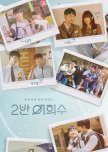
Heesu in Class 2: When a Strong Webtoon Becomes a Weak Drama
The live-action adaptation of Heesu in Class 2 strays so far from its source material that it could easily be mistaken for an entirely different show. Characters like Hui Su and Seung Won, who should have been central, are reduced to supporting roles with minimal screen time. In contrast to the webtoon, where character dynamics felt natural and emotionally resonant, the series suffers from lifeless interactions, awkward silences, and stilted dialogue that undermines any sense of chemistry or connection.Seung Won’s character, in particular, is almost unrecognizable. While he’s portrayed as socially awkward, the adaptation handles it so poorly that it feels more like a caricature. The changes to his demeanor and behavior strip away all the depth and relatability found in the webtoon.
Though the storyline attempts to build romance, it leans heavily into tired tropes of miscommunication without any real payoff. The lack of meaningful interactions between the leads makes the romance feel forced, and at times, lacking any real connection/chemistry. The one thing that is clear is who is meant to like whom, but even that is buried beneath clumsy writing and the screenwriters choices.
It’s important to note that the actors did there best with what was given to them. Which was a weak script and misguided direction. Unfortunately, their efforts couldn’t salvage a show that stripped away much of what would’ve made it special. Instead of embracing its BL roots, the adaptation pivots toward a more heteronormative angle, leaving viewers with little more than two fleeting minutes of any meaningful connection between the supposed main characters.
In the end, Heesu in Class 2 had the potential to be a heartfelt and engaging series, but poor adaptation choices rendered it dull, disconnected, and disappointing.
I usually try not to compare when adaptations make changes, but this one was so poorly handled that I couldn’t help it.
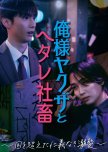
A Promising Romance Held Back by Its Short Runtime
Ore-sama Yakuza to Hetare Shachiku: Kuni wo Koeta Jingi Naki Dekiai is a charming series, but it definitely feels like it needs more time to fully develop. The cast does a great job with what they're given, but the short episode lengths leave many questions unanswered and key moments underexplored. While the chemistry between the characters is evident, the brevity of the episodes prevents it from truly shining. A re-adaptation of the show would be a great solution and keeping the same talented cast. . With the episode count remaining at 10 but extending the runtime to at least 30-45 minutes per episode. That would allow for a deeper exploration of the story and relationships, making it a more rewarding and fulfilling experience.
Love Against the Crown: A Tale of Devotion, Deception, and Defiant
This series masterfully intertwines themes of forbidden love, unrequited affection, greed, homophobia, and corruption. Beautifully paced, it delivers an outstanding screenplay, complemented by breathtaking cinematography and a well-balanced soundtrack that enhances every emotional beat.Set in 1963, the story follows Prince Saenkaew, Sasin, and Pin through a journey of love, secrecy, and sacrifice. Prince Saenkaew has always known he was gay, but when his parents discover the truth, tragedy ensues. Burdened by his father’s strict expectations, he suppresses his true self, until he meets Sasin.
Sasin and Pin are cousins who share a close, sibling-like bond. However, Prince Saenkaew is forced into an arranged marriage with Pin, despite not loving her. Sasin begins to suspect something is wrong and pushes Prince Saenkaew to open up. After witnessing the prince’s father physically abuse him and hearing unsettling words, Sasin starts uncovering the painful truth.
Determined to help, Sasin joins Prince Saenkaew in plotting to stop the wedding. During their secret late-night meetings, the two develop deep feelings for each other. Once there plan succeeds, they would confess everything to Pin, but disaster strikes.
Prince Kamfa, Saenkaew’s father, becomes aware of their closeness and resorts to despicable measures, threats, manipulation, and even attempted murder, to separate them. His cruelty is horrifying; blaming his son for his mother’s death because of his sexuality reveals the depth of his corruption and greed. Even with his reasons, it doesn’t excuse anything.
When Pin learns the truth about Prince Saenkaew and Sasin, she is consumed by heartbreak and anger. Despite knowing Saenkaew can never love her as she wishes, she chooses to go through with the marriage, saying bitterly, “I will end up in pain no matter what, so I should just get married, and all three of us will end up in pain together.”
Her pain intensifies when she discovers that nearly all of their friends already knew. Though it’s understandable she felt betrayed, she fails to fully recognize that in that era, being homosexual was considered deeply taboo, something one could not speak of openly. Her reaction, while human, is guided by love, jealousy, and sorrow.
Rachawadi, the owner of a nightclub and a voice of wisdom in the story, offers Pin a poignant warning:
“One day you could wake up and realize that a man who loved you with all his heart looks at you full of hatred. One day you could hear Prince Saenkaew call your name, but it isn’t in the gentle tone like he used to. Instead, his voice will be full of anger and torment. That is the day you will finally realize the taste of real pain.”
This prophecy comes true as Pin’s attempts to force Saenkaew’s love only deepen her suffering. Eventually, she sees the truth of Rachawadi’s words. When her parents, Bodin and Wad, discover the affair and plot to exploit it for financial gain. Her parents are truly despicable and it shows with the measures they were willing to take to get what they wanted. Pin finally chooses to do the right thing knowing she would still be in pain but it would pass over time. She helps reunite Prince Saenkaew and Sasin.
In a touching moment, Saenkaew’s grandmother discovers their relationship after witnessing them share a kiss. Fearing rejection, Saenkaew apologizes, but to his surprise, she accepts him warmly, saying that if he had confided in her sooner, she would have helped. Her compassion provides a rare moment of light and hope in their turbulent journey.
However, more trouble follows as Prince Saenkaew and Sasin plans their big escape with the help of Pin, his grandmother and Homthip. It’s deeply unsettling to witness how every parent in the series manipulates their children for personal and financial gain. The sheer greed and selfishness displayed are both heartbreaking and infuriating, adding another layer of tragedy to an already emotional story.
One character who truly stood out was Homthip. From the beginning, she empathized deeply with Prince Saenkaew, understanding the pain of hiding his true self to please a cruel father and survive his uncle Inthra’s constant attempts to expose him. Homthip supported the couple steadfastly, proving herself to be the story’s true MVP.
Overall, this series was an emotional triumph, beautifully acted, thoughtfully written, and profoundly moving. Every performance felt authentic, every scene deliberate. I’m very pleased that almost everyone got the ending they deserved. It’s one of the strongest Thai BL dramas of 2025, and without question, one of my personal favorites of the year.
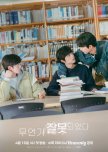
Going Nowhere Together: Something's Not Right indeed!
As someone who has watched many K-BL dramas, I found this series to be particularly frustrating. The central friendship between Do Ba U and Ji Hun, which is supposedly rooted in childhood, lacks the authenticity and depth one would expect from such a long-standing bond. But somehow they made it seem as though they’ve only just met, making it difficult to understand how their friendship has endured over the years. The contrast in their personalities, one slightly mature, the other more childish, had the potential to create an engaging dynamic, but it was poorly developed and ultimately became tiresome.Jung Ha Min, a character who could have brought depth or tension to the narrative, was reduced to a familiar cliché. His actions often came across as intrusive rather than helpful, particularly in his attempts to support Do Ba U. His presence added little to the story, and his character could have been utilized in a far more meaningful way, but we got the cliché. The central misunderstanding that drives much of the conflict felt contrived and unnecessary. For characters who are portrayed as childhood friends, the lack of open communication was both unrealistic and frustrating. While fear and hesitation are understandable, the prolonged miscommunication undermined the emotional impact the story seemed to aim for.
Finally, the romantic confession, a pivotal moment, was disappointingly random and poorly timed. There were several earlier opportunities for a heartfelt revelation that were simply ignored, which made the eventual confession feel forced and disconnected from the narrative’s progression.
In summary, this drama had a promising premise but faltered due to weak character development, overused tropes, and missed emotional beats

Royal Bonds and Personal Battles
The Next Prince” is a beautifully crafted series that combines stunning cinematography with a well curated soundtrack, elevating the viewing experience from start to finish. The pacing is balanced, allowing each character the space to grow and fulfill their individual arcs in a meaningful way.The series blends romance, drama, action, and a touch of mystery. One of its standout strengths is how it portrays the struggles within each royal lineage, emphasizing their efforts to challenge tradition and drive change. From Khanin’s determination to reform, Ava’s powerful representation of female strength and equality, to Ramil’s journey of self-discovery and independence, each storyline feels purposeful and engaging.
The chemistry among the characters is undeniable. Khanin’s subtle pursuit of Charan was charming and heartfelt, while Ramil and Paytai’s fiery dynamic added a compelling contrast. Their emotional reconciliation toward the end was especially impactful. Ramil’s eventual stand against his father was a long awaited moment of growth that added depth to his arc. Calvin and Jay’s limited screen time was appreciated, though it left me wishing we had seen more from them, especially with Ava, whose presence deserved greater exploration. But they are supporting actors/actress so I expected nothing less.
The set design/costume designs and choice of locations were exceptional, adding richness and authenticity to the narrative. Overall, the series concluded on a satisfying note, resolving conflicts, mending relationships, and giving each love story the space to blossom naturally.

Top Form: A Refreshing Drama That Leaves You Wanting More
Please note that the following contains a minor spoiler"Top Form" is a highly engaging series that truly stands out for its refreshing approach to storytelling. Unlike many dramas that rely on prolonged misunderstandings or unnecessary conflict to drive the plot, this series avoids that common pitfall, keeping things tight and focused. (Although, to be fair, I do appreciate a bit of misunderstandings when it's executed well!) That being said, the show’s one flaw is that it feels too short. This is one of those rare instances where I actually wished for longer episodes (over an hour or more) because it would have allowed the story to breathe and given more space to explore the characters and their arcs, especially the supporting cast like Jade, Johnny, and Naru. As it stands, there are a few unanswered questions, leaving me wanting more. Additionally, I’m left eagerly needing an update on Akin's decision and what the outcome would be for his future if he chooses to accept the offer he was given.
I genuinely hope we get a season 2 or, at the very least, a special 5-episode mini-series to tie up some loose ends and give the characters the resolution they deserve.

